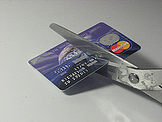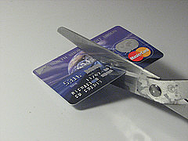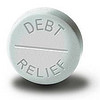
Too much debt? Not enough money? What can you do?
Millions of consumers carry so much credit card debt that it will be almost impossible for them to ever repay the debt by making just the minimum payments.
Of course, the credit card industry knows this, in fact, they really do not want you to ever pay off all of your debt, because their profits come from the outrageous interest and fees they charge!
But if you have had enough and are serious about getting out of debt, here's a plan:
STOP USING YOUR CREDIT CARDS!
As long as you keep charging, you'll never get out of debt.
If you are serious about, cut them up, burn them, get totally rid of these monsters!
FIND OUT HOW MUCH YOU CAN APPLY TO REPAYING THESE CARDS EACH MONTH.
You should use a basic budget planner to help determine how much you have coming in (net, after all deductions) and how much you have going out.
If you total all of you balances, the average minimum monthly payment required will be about 2% of the balance.
Example: If you have $10,000 of total credit card debt, at 2%, your minimum payment would be about $200/month.
If you have enough left over to make more than the minimum payments due on all of your cards, great! (If not, we'll show you what to do later.)
List all of you cards by:
- Balance
- Interest rate
- minimum payment
Let's say you have $300/month to apply to your credit card balances.
Take the lowest balance and pay the minimum due and add an extra $100. Pay the minimum on the remaining cards, for a total of $300.
Once the first card is paid off, apply the minimum you were paying on it plus the extra $100 and pay that toward the next.
Example:
Card 1 has minimum of $50. You pay $150 until the balance is $0.
Card 2 has a minimum of $100. You know pay $150 (minimum of first plus $100) plus the usual $100 for a total of $250.
When it is paid off, you do the same for card #3.
You won't pay them off over night, but you'll probably cut 7-10 years and save thousands in interest and fees.
BUT WHAT IF YOU DON'T HAVE THE EXTRA $100 TO PUT TOWARDS THIS PLAN?
The you will need to contact a professional Debt Management Company to determine if you should enroll in a Debt Management Program Debt Settlement Program.
In a Debt Management Program, your creditors agree to reduce the interest rates and fees. You will make one payment monthly (probably close to the $200) and it will be disburse to each creditor according to the agreements.
It will probably take about 48 months or so to pay off all of your cards.
BUT WHAT IF YOU DON'T EVEN HAVE THE $200 AT THE END OF THE MONTH?
Then you will most likely be enrolled in a Debt Settlement Program.
Credit card companies will charge off delinquent debts after about 180 days. These accounts will usually be transferred to a debt collection agency.
At this point, a settlement of approximately 50% of the balance is possible.
Although it is possible to do-it-yourself, debt settlement takes a lot of time and dealing with professional debt collectors can be very frustrating.
If none of these work for you, then you may consider seeking the advice of a bankruptcy attorney.




 a listing of assets and liabilities at the time the debt was canceled. You may include Form 982 or a simple cover letter claiming insolvency."
a listing of assets and liabilities at the time the debt was canceled. You may include Form 982 or a simple cover letter claiming insolvency."


 What is the best debt elimination plan?
What is the best debt elimination plan? A prospect wrote, "Christmas is over and I charged too much!" Can you help with debt settlement advice?
A prospect wrote, "Christmas is over and I charged too much!" Can you help with debt settlement advice? When faced with too much credit card debt, you really only have 5 options:
When faced with too much credit card debt, you really only have 5 options:


